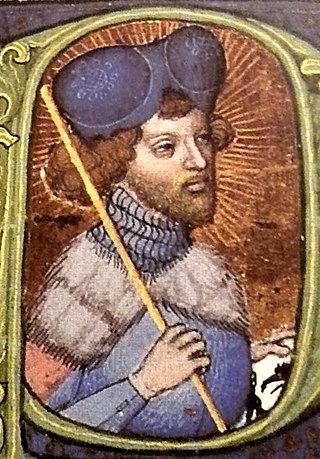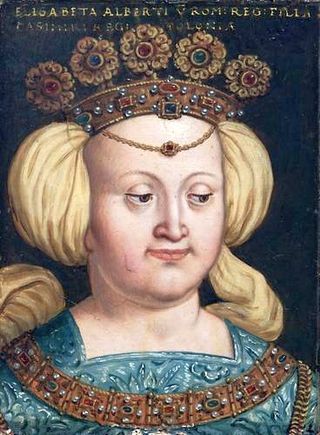This article relies largely or entirely on a single source .(January 2024) |
The imperial election of 1438 was an imperial election held to select the emperor of the Holy Roman Empire. It took place in Frankfurt on March 18.
This article relies largely or entirely on a single source .(January 2024) |
The imperial election of 1438 was an imperial election held to select the emperor of the Holy Roman Empire. It took place in Frankfurt on March 18.
Sigismund, Holy Roman Emperor, died on December 9, 1437. [1] His son-in-law Albert II of Germany succeeded him as Jure uxoris king of Hungary, Croatia and Bohemia.
The prince-electors convened to elect his successor were:
Albert, as king of Bohemia, was entitled to a vote. However, he was in Bohemia suppressing an uprising and was not present at the election.
Albert was elected.

Frederick III was Holy Roman Emperor from 1452 until his death in 1493. He was the penultimate emperor to be crowned by the pope, and the last to be crowned in Rome. He was the first emperor from the House of Habsburg, which was to retain the title until it disappeared centuries later.

Wenceslaus IV, also known as Wenceslaus of Luxembourg, was King of Bohemia from 1378 until his death and King of Germany from 1376 until he was deposed in 1400. As he belonged to the House of Luxembourg, he was also Duke of Luxembourg from 1383 to 1388.

Sigismund of Luxembourg was Holy Roman Emperor from 1433 until his death in 1437. He was elected King of Germany in 1410, and was also King of Bohemia from 1419, as well as prince-elector of Brandenburg. As the husband of Mary, Queen of Hungary, he was also King of Hungary and Croatia from 1387. He was the last male member of the House of Luxembourg.

Frederick was the last Burgrave of Nuremberg from 1397 to 1427, Margrave of Brandenburg-Ansbach from 1398, Margrave of Brandenburg-Kulmbach from 1420, and Elector of Brandenburg from 1415 until his death. He became the first member of the House of Hohenzollern to rule the Margraviate of Brandenburg.

The House of Luxembourg or Luxembourg dynasty was a royal family of the Holy Roman Empire in the Late Middle Ages, whose members between 1308 and 1437 ruled as kings of Germany and Holy Roman emperors as well as kings of Bohemia, Hungary and Croatia. Their rule was twice interrupted by the rival House of Wittelsbach. The family takes its name from its ancestral county of Luxembourg which they continued to hold.

Elizabeth of Austria was Queen of Poland and Grand Duchess of Lithuania as the wife of King Casimir IV of Poland. Orphaned at an early age, she spent her childhood in the court of Holy Roman Emperor Frederick III. As one of the three surviving grandchildren of Emperor Sigismund, she had a strong claim to the kingdoms of Hungary and Bohemia. That made her an attractive bride for a Polish prince. The Polish nobility, seeking to increase Polish influence in Hungary and Bohemia, pursued marriage with Elizabeth since she was born and finally succeeded in 1454. Her marriage to Casimir was one of the most successful royal marriages in Poland. She gave birth to thirteen children, eleven of whom survived to adulthood. Four of her sons were crowned as kings.
The imperial election of 1376 was an imperial election held to select the emperor of the Holy Roman Empire. It took place in Frankfurt on 10 June.
The imperial election of 22 May 1400 was an imperial election held to select the emperor of the Holy Roman Empire. It took place in Frankfurt.

The imperial election of 21 August 1400 was an imperial election held to select the emperor of the Holy Roman Empire. It took place in Rhens.
In the years 1410 and 1411 saw three royal elections in the Holy Roman Empire. The elections were prompted by the death of previous King Rupert in 1410 and, after two contested elections in 1410, resulted in Sigismund of Hungary being recognized as the new king in 1411.

The imperial election of 1440 was an imperial election held to select the emperor of the Holy Roman Empire. It took place in Frankfurt on February 2.
The imperial election of 1575 was an imperial election held to select the emperor of the Holy Roman Empire. It took place in Regensburg on October 27.

The imperial election of 1612 was an imperial election held to select the emperor of the Holy Roman Empire. It took place in Frankfurt on 13 June.
The imperial election of 1619 was an imperial election held to select the emperor of the Holy Roman Empire. It took place in Frankfurt on August 28.
The imperial election of 1636 was an imperial election held to select the emperor of the Holy Roman Empire. It took place in Regensburg on December 22.
The imperial election of 1653 was an imperial election held to select the emperor of the Holy Roman Empire. It took place in Augsburg on May 31.

The imperial election of 1742 was an imperial election held to select the emperor of the Holy Roman Empire. It took place in Frankfurt on January 24. The result was the election of Charles Albert of Bavaria, the first non-Habsburg emperor in three hundred years.
The imperial election of 1745 was an imperial election held to select the emperor of the Holy Roman Empire. It took place in Frankfurt on September 13.

The imperial election of 1273 was an imperial election held to select the emperor of the Holy Roman Empire. It took place in Frankfurt on October 1.

The imperial election of 19 October 1314 was an imperial election held to select the emperor of the Holy Roman Empire. It took place in Sachsenhausen, near Frankfurt.